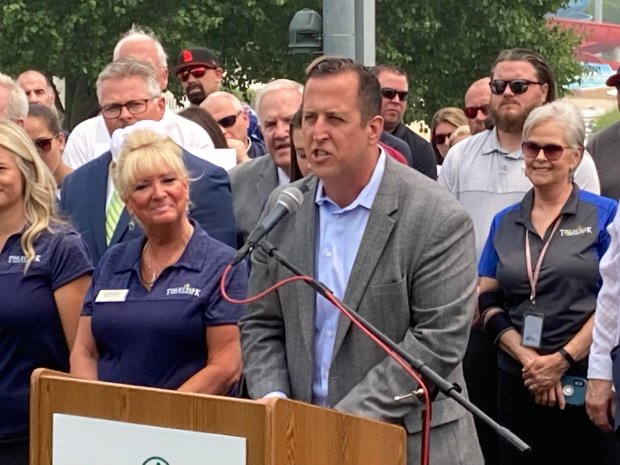Both candidates seeking to represent the 19th District in the Illinois Senate say high property taxes are a top concern of voters in a district that takes in several south and southwest suburban communities.
Michael Hastings, 43, D-Frankfort, first began serving in the Senate in 2013 and is facing Samantha Jean Gasca, 37, of New Lenox in the November election.
Gasca was one of three candidates in the Republican primary in March while Hastings was unopposed on the Democratic side.
Hastings said boosting state funding to education will help reduce the reliance by school districts on property taxes.
“Given that 80% to 85% of property taxes are levied by local school districts and community colleges, state funding plays a critical role in easing the financial pressures faced by school boards,” he said.
Hastings said he has been a proponent of the state’s evidence-based funding model, which aims to equalize school funding across districts and do away with disparities between well-funded and underfunded districts.
“This model is key to creating a more equitable education system where all students have access to quality opportunities, regardless of their background,” he said.
State Sen. Michael Hastings, D-Frankfort, urges Gov. J.B. Pritzker to sign legislation to transfer the former Tinley Park Mental Health Center land to the Park District.

Samantha Gasca, of New Lenox, is running as a Republican against incumbent Sen. Michael Hastings in the 19th Senate District. (Samantha Gasca)
Gasca said there are seniors in her district paying $10,000 a year in property taxes, with much of the money going to school districts although their children are grown and out of the school system.
She said some of the biggest property tax increases have been felt in the eastern portion of the 19th, particularly in Rich Township. Gasca said residents have seen bills jump following a reassessment of property.
She said on her website school districts engage in needless and reckless spending, such as “extreme salaries to administrative officials.”
Gasca told the Daily Southtown she’s not directly accusing school districts of reckless spending, but that “independent audits of school districts by an external private auditor” are needed to “see if there is reckless spending.”
Outside audits shouldn’t be limited to school districts, with municipal governments also undergoing scrutiny for how taxpayer money is spent, Gasca said.
She said she is a proponent of “zero-balance” budgeting for all local governments, meaning that each year they start from scratch to create a new spending plan rather than duplicating or increasing the prior year budget.
It will be the second time in the past two elections where Hastings has faced a general election challenger after Lockport Republican Patrick Sheehan conceded a very close race in 2022. Sheehan was appointed to fill a state representative seat earlier this year.
The district includes all or parts of Country Club Hills, Frankfort, Hazel Crest, Homewood, Joliet, Lockport, Matteson, New Lenox, Oak Forest, Orland Park and Tinley Park.
Hastings earned a bachelor’s of science degree in leadership and management at the U.S. Military Academy at West Point, and a master’s in business administration from the University of Illinois at Urbana-Champaign. He has a law degree from John Marshall Law School in Chicago.
He served in the Army and was deployed to Iraq following the Sept. 11, 2001, terrorist attacks.
Gasca said she earned her master of divinity and pastoral studies degrees in 2021 from Moody Theological Seminary.
She worked as a prison chaplain at Sheridan Correctional Center, a medium security men’s prison about 70 miles west of Chicago, and said she has worked with the homeless and people with substance abuse issues.
Gasca lost a bid for school board in 2022 in New Lenox Elementary District 122.
On her website, Gasca said “maintaining the purity” of the U.S. Constitution is a priority for her, particularly the Second Amendment right to keep and bear firearms.
Talking with the Daily Southtown, she said things such as obtaining a Firearm Owners Identification Card can be an obstacle for 19th District residents who want to own a gun.
“It’s a privilege in the U.S. Constitution,” Gasca said. “There should not be this added level of permission.”.
Still, Gasca said she believes that some people should not be able to carry a firearm.
“I don’t know exactly how we go about doing this, but consider how people with known, severe mental health issues” can gain access to firearms, she said.
Gasca said she is not entirely fluent in state laws and regulations on that and other issues, but said “I am open to learning, open to the conversation.”
Hastings said supporting police, firefighters and other first responders is a priority, and he favors having zero-dollar co-pays for mental health treatments specifically for first responders, “ensuring they have access to crucial support without financial barriers.”
State campaign finance disclosure reports show Gasca’s campaign took in $700 in contributions during the April-June quarter, and at the end of June she had just under $1,100 available to spend.
For Hastings, receipts in the April-June period totaled nearly $21,400. Expenses for the quarter were $64,500, and at the end of the period the campaign had nearly $338,000 available to spend.
Since then, however, Hastings’ campaign has seen contributions in excess of $166,000, according to disclosure filings, with most of the donations coming from organized labor.
mnolan@southtownstar.com



